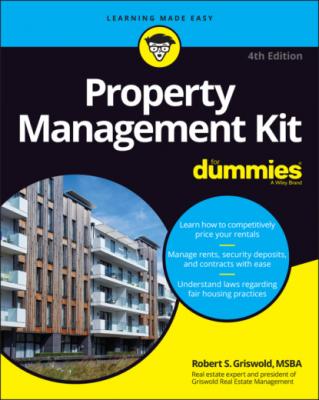Property Management Kit For Dummies. Robert S. Griswold
Чтение книги онлайн.
Читать онлайн книгу Property Management Kit For Dummies - Robert S. Griswold страница 14
 tenant problems and the pros and cons of alternatives to an eviction.
tenant problems and the pros and cons of alternatives to an eviction.
Maintaining the property
Are you familiar with the saying “To own is to maintain”? When you have only a few rental units or are just starting, you often do much of the maintenance work on your units yourself. But as you acquire more properties or advance in your primary career, you need to explore the benefits and consequences of using employees. If you own a medium-size to large property, having an on-site employee who’s responsible for its day-to-day management is mandatory.
To keep your property in tip-top shape, you also need to work with outside vendors and suppliers who are pros within their industry. Always keep in mind that you get what you pay for and that maintenance can be one of the largest expenses that landlords face. Part 4 helps you navigate the nitty-gritty, hands-on aspects of managing employees, vendors, and contractors and maintaining your property.
Protecting your investment
Like many property managers, you probably consider your property to be an investment. If you continuously lose money, having the property isn’t worth the hassle or the expense, right? Not to worry. Although you can’t predict bad weather or crime, you can safeguard the value of your investment by doing the following:
Being aware of environmental hazards that can occur: Minimize your risk, and be prepared for natural or environmental hazards such as storms, fire, carbon-monoxide gas, bedbugs, and mold. See Chapter 19 for details.
Buying the necessary insurance: You can’t avoid buying insurance, so I make sure that you know enough to be dangerous when your insurance agent says you need coverage for snowstorms at your duplex in Phoenix. Chapter 20 covers the types of insurance you need to consider.
Paying your taxes: Property taxes are a reality of life almost everywhere. Chapter 20 makes sure that you know how they’re calculated and what you can do to minimize your tax payments by appealing your property’s assessed value when market conditions decline.
Tracking your money: You may not want to be a greedy landlord, but you’d better track your income and your expenses, as you’ll need to file income tax returns annually. In Chapter 21, I cover the best way to organize your files and the top property management software that you can use to streamline and simplify this important but potentially time-consuming aspect of managing rental housing.
Increasing your cash flow: Sometimes, recouping all the costs for your property isn’t easy, so you may need to find ways to get more cash in your hands. As you discover in Chapter 22, a wide assortment of options awaits, including government-subsidized housing programs, special niche housing markets, and lease options.
Chapter 2
Do You Have What It Takes to Manage Your Own Rental Property?
IN THIS CHAPTER
Real estate can be a great source of income, whether you’re looking for steady, supplemental retirement income or a secure financial future. Most residential rental property owners want to become financially independent, and real estate is a proven investment strategy for achieving that goal. But after you sign your name on the dotted line and officially enter the world of residential rental property ownership, you face some tough decisions. One of the very first concerns is who handles the day-to-day management of your residential rental property. You have units to lease, rents to collect, tenant complaints to respond to, and a whole host of property management issues to deal with. So you need to determine whether you have what it takes to manage your own residential rental property or whether you should hire and oversee a professional property management firm.
Owning investment real estate and managing rental units are two separate functions, and although nearly everyone can invest in real estate, managing it takes time, special skills, and the right personality. In this chapter, I highlight the importance of relationships with people, because property management is really people management. I also give you the lowdown on some of the advantages of owning residential rental property and help you assess whether you have what it takes to manage your own property.
Understanding That Managing Residential Rental Property Is a People Business
Some rental property owners find themselves managing their own properties without even knowing what management requires. Managing the physical aspects of your properties (the buildings and common areas) and keeping track of your income and expenses are fairly straightforward tasks. But many rental property owners’ most difficult lesson is the management of people.
Rental housing management requires you to deal with many more people than you may think. In addition to your tenants, you interact with rental prospects, contractors, vendors, suppliers, neighbors, and government employees. People, not the property, create most rental management problems. An unpredictable aspect always exists in any relationship with people.
Identifying the Types of Real Estate Owners
Residential rental property management has been around for hundreds of years, ever since property owners first realized that they could earn income on their land and buildings by renting them to tenants. These days, the title landlord is no longer bestowed only on the landed gentry. There are as many different ways that people become property owners as there are types of rental properties. Although the nature of the business has changed over the centuries, today you can classify rental property owners in two categories: the inadvertent rental property owner and the long-term investment rental property owner. No matter which category you find yourself in, one thing is constant: The key to your success is sound management.
The inadvertent rental